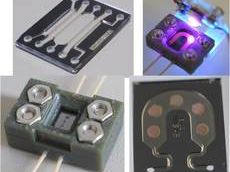Life Chip
Summary
The aim of the LifeChip-Project is to investigate of new microfluidic concepts in order to cultivate mammalian cells inside a chip and to monitor their state. Cells will be placed inside the chip, supplied with nutrients and gases for several days and removed without harming them. Furthermore, the uptake of oxygen shall be monitored.
Project description
Studies of novel medical treatment as well as of biological research have a high demand of mammalian cells. In spite of recent developments in cell cultivation, some cell types are still elaborately cultivated in Petri dishes. However, microfluidic systems are well suited for efficient reproduction of cells. Therefore, the aim of the project is to design a microfluidic system which fulfils the stringent requirements of cell cultivation.
For that aim, the cells have to be placed at the designated locations by coating the surface partially with Parylene. For the cells’ survival and growth, a constant supply with nutrition and oxygen is required as well as the disposal of waste. As perfusion affects the growth undesirably, the supply will be realized solely by diffusion. Therefore, the usage of hydrogel walls is planned as they feature high biocompatibility as well as various possibilities to tune porosity. After the cell division has taken place, the cells have to be detached from the chip without damaging them.
LifeChip shall enable implementation of all steps of cell cultivation with minimal effort.
Contact
Prof. Dr.-Ing. M. Vellekoop
IMSAS, NW1, Room O2140
Phone.: +49 421 218 62604
E-mail: contact
The project LifeChip is funded as M4 Exploratory Projectby the University of Bremen in the context of the Excellence Initiative.
Important publications
F. Bunge, S. van den Driesche, M. J. Vellekoop. Microfluidic platform for the long-term on-chip cultivation of mammalian cells for lab-on-a-chip applications. Sensors, 17(7):1603, 2017. DOI: 10.3390/s17071603
F. Bunge, C. Habben, S. van den Driesche, M. J. Vellekoop. Integration and characterization of nanoporous aluminium oxide membranes in microfluidic chips. Proc. of IEEE MEMS, January 2018.
F. Bunge, S. van den Driesche, A. Waite, U. Mirastschijski, M. J. Vellekoop. Microfluidic oxygen sensor based on silica gels for longterm experiments. Proc. of IEEE MEMS, January 2018.
F. Bunge, S. van den Driesche, A. Waite, U. Mirastschijski, M. J. Vellekoop. μrespirometer to determine the oxygen consumption rate of mammalian cells in a microfluidic cell culture. Proc. of IEEE MEMS, January 2017. DOI: 10.1109/MEMSYS.2017.7863430


